Rev. Catherine E. Williams – Jan 15, 2017 – Revelation 7: 9-17
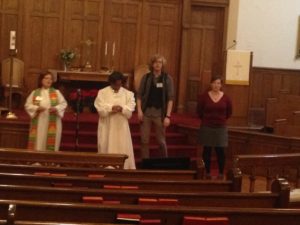 “God imagines…” signals a divine reality – a reality that exists already as far as God is concerned, although not quite yet as far as humans are concerned. “God imagines” is an invitation to enter a divine space called the Kingdom or the Reign of God, a place that holds the substance of the things we humans hope for, and dream of.
“God imagines…” signals a divine reality – a reality that exists already as far as God is concerned, although not quite yet as far as humans are concerned. “God imagines” is an invitation to enter a divine space called the Kingdom or the Reign of God, a place that holds the substance of the things we humans hope for, and dream of.
Things like peace on earth, a welcoming, inclusive community, an egalitarian society, and the total harmony of all creation – these already exist in God’s vision. They are the future that people of God lean into as we go about daily living, but we lean in because we have been inspired by the divine imagination and touched by the divine Spirit in some compelling way. Ever so often we get weary and frustrated, as Jana reminded us last week. Something happens in the home, in the community, in the country or around the world that takes the wind out of our sails. We throw up our hands and throw in the towel – why bother? And then God, for whom this peace, and inclusiveness, this equality and harmony already exists, touches our hearts again through some divine encounter, and we are inspired once more to live and lean into that vision; we become convinced in some uncanny way that this is real after all, and worth pursuing. Such is the power of God’s imagination; such is the work of God’s Spirit in the world. Such was the work of the biblical prophets like John who wrote the Revelation, this book from which our lesson was read this morning.
If you want to see imagination on steroids, you’re welcome to read the whole book of Revelation. Oh it starts off pragmatic enough with letters to seven churches, commending or chastising them based on their faithfulness to God’s ways. And then we get to chapter four and all imagination breaks loose: thrones, heavenly beings, beasts and horses, and dragons. Imagery and metaphor converge upon one another with lightning speed and thundering volume – it’s all so compelling and awesome that books, movies, songs, doctrines, and forecasts of human destiny have all emerged out of this book. But the fantastic tone of the book of Revelation is nothing strange if you understand apocalyptic writings; they envision a just and rightful end to injustice and human wrongs.
When we read the various books of the Bible it helps to think of reading through a newspaper; we interpret what we read according the nature of the writing. So the advertisements, the sports pages, the advice columns, and the comic strips all belong in the newspaper, but we don’t evaluate the information in the advice column the way we evaluate the information in the comic strip. In the same way the psalms, the law, the wisdom literature, prophets, the gospels, letters, and apocalyptic writings all belong in the Bible, but we understand the poetry in a much different way than we understand the prophetic oracles. Apocalyptic writings like Revelation tend to be filled with graphic images of all kinds: from violence and wrathful judgment to peaceful restoration and harmonious resolution to earthly wrongs. It’s a desperate yearning for right to prevail and for wrong to be punished. I just needed to put that perspective in place before I get to today’s vision, which thankfully is one of the more alluring ones.
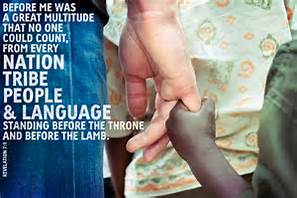 In Revelation 7 John entered into God’s imagination when he looked and saw “a great multitude that no one could count, from every nation, from all tribes and peoples and languages, standing before the throne and before the Lamb, robed in white with palm branches in their hands. They cried out in a loud voice saying, ‘salvation belongs to our God who is seated on the throne, and to the Lamb.’” (Rev. 7:9-10 NRSV) In these verses, John skips to the end of the cosmic book, so to speak, to give us a glimpse of a community shaped by God’s vision of inclusiveness. Let’s remember that this was God’s vision from the very beginning when he called Abraham. In Genesis, the book of beginnings, God promised Abraham that in him all the families of the earth will be blessed, and that his progeny of the faithful would
In Revelation 7 John entered into God’s imagination when he looked and saw “a great multitude that no one could count, from every nation, from all tribes and peoples and languages, standing before the throne and before the Lamb, robed in white with palm branches in their hands. They cried out in a loud voice saying, ‘salvation belongs to our God who is seated on the throne, and to the Lamb.’” (Rev. 7:9-10 NRSV) In these verses, John skips to the end of the cosmic book, so to speak, to give us a glimpse of a community shaped by God’s vision of inclusiveness. Let’s remember that this was God’s vision from the very beginning when he called Abraham. In Genesis, the book of beginnings, God promised Abraham that in him all the families of the earth will be blessed, and that his progeny of the faithful would 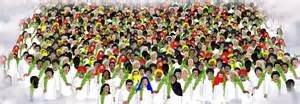 be more in number than the stars of the heaven or the sand of the sea. I think we’re looking at them here in Revelation. This is what New Testament scholar Brian Blount scholar calls the “innumerable, international multitude” – people from every nation, every tribe, every ethnic group, every language.
be more in number than the stars of the heaven or the sand of the sea. I think we’re looking at them here in Revelation. This is what New Testament scholar Brian Blount scholar calls the “innumerable, international multitude” – people from every nation, every tribe, every ethnic group, every language.
The earthly ministry of Jesus also demonstrated this vision of inclusiveness. You may recall the repeated derogatory comments made by Jesus’ detractors regarding the kind of company he kept. His roadies were fishermen and tax collectors. His groupies came from the palace and from the pub. He was playful with the kids and gentle with the mothers-in-law. Jesus told so many stories about this innumerable international multitude we see in Revelation. His version of “once upon a time,” was, “the kingdom of heaven is like…” These stories illustrated a reality that God imagines where the first shall be last and the least shall be greatest, and where everyone is invited to the great victory banquet – everyone!
This inclusiveness is part of the DNA of God we receive at our baptism and when we come to faith in Jesus Christ. The Spirit of God who grafts us into the church and who leads us to maturity works within each of us to develop this disposition of inclusiveness. And doesn’t our own congregational mission statement call us into this vision of God? We are a diverse community, joyfully responding to God’s love and growing as disciples of Christ by nurturing, teaching, reaching, and serving all people. It says right there on the front of your bulletin that all are welcome here: whatever your ethnicity, culture, nationality, faith tradition, age, gender, hair type, skin tone, educational background, profession or trade, sexual orientation, degree of physical ability, state of physical or mental health, whatever your political affiliation – ALL ARE WELCOME. Continue reading “God Imagines…All Are Welcome”
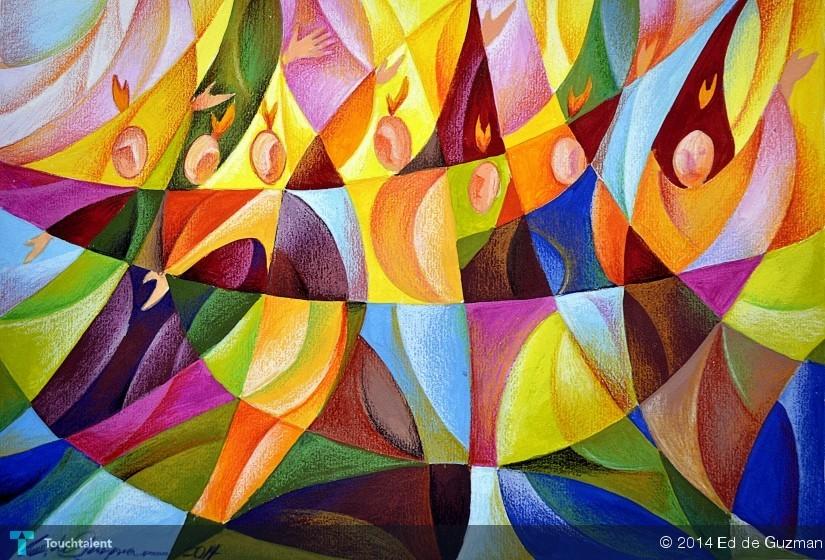
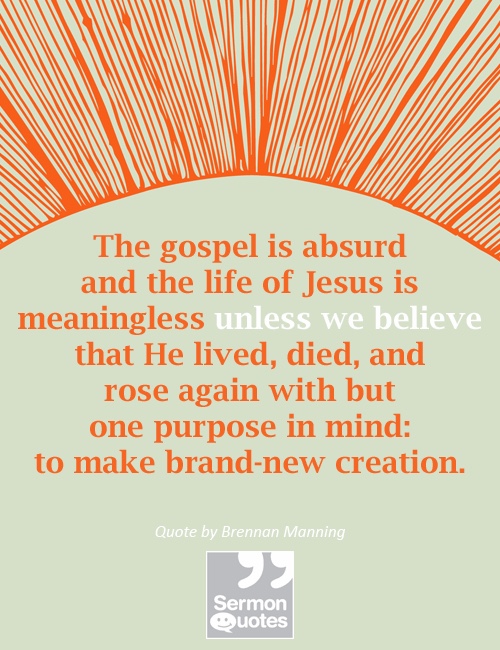 In illustrating the scripture, Pastor Jenny used Brennan Manning‘s famous quotation, “The gospel is absurd, and the life of Jesus is meaningless unless we believe. . . . This, my friend, is what it means to be a real Christian.” She stated that it was time for our own Pentecost. We need to hear and understand each other across all divides. The Holy Spirit is calling for inclusiveness, and diversity, especially now in the midst of the most segregated time in our country.
In illustrating the scripture, Pastor Jenny used Brennan Manning‘s famous quotation, “The gospel is absurd, and the life of Jesus is meaningless unless we believe. . . . This, my friend, is what it means to be a real Christian.” She stated that it was time for our own Pentecost. We need to hear and understand each other across all divides. The Holy Spirit is calling for inclusiveness, and diversity, especially now in the midst of the most segregated time in our country. 

 Rev. Jenny Smith Walz preached on September 2, 2018 in the sermon series “Swing Forward”, on the topic ‘Growing Pains’.
Rev. Jenny Smith Walz preached on September 2, 2018 in the sermon series “Swing Forward”, on the topic ‘Growing Pains’.
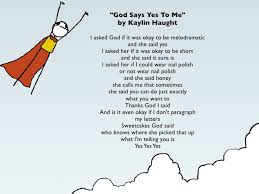
 “God imagines…” signals a divine reality – a reality that exists already as far as God is concerned, although not quite yet as far as humans are concerned. “God imagines” is an invitation to enter a divine space called the Kingdom or the Reign of God, a place that holds the substance of the things we humans hope for, and dream of.
“God imagines…” signals a divine reality – a reality that exists already as far as God is concerned, although not quite yet as far as humans are concerned. “God imagines” is an invitation to enter a divine space called the Kingdom or the Reign of God, a place that holds the substance of the things we humans hope for, and dream of.  In
In  be more in number than the stars of the heaven or the sand of the sea. I think we’re looking at them here in Revelation. This is what New Testament scholar
be more in number than the stars of the heaven or the sand of the sea. I think we’re looking at them here in Revelation. This is what New Testament scholar